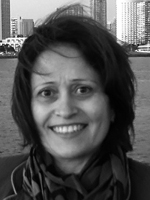Dr. Ina Merdjanova, PhD

Areas of interest
- Politics of Religion and Secularism
- Gender and Religion
- Islam and Orthodox Christianity in Southeast Europe
- Peacebuilding in Southeast Europe and Turkey
Neo-Secularisation, the Orthodox Church and the Rise of Anti-Gender Politics in Bulgaria
This project seeks to explore the social condition of what I call ‘neo-secularisation’ in Bulgaria by analysing how the Orthodox Church is both implicated in and affected by this condition. I interpret neo-secularisation as the complex process wherein – after a period of desecularisation of a previously secularised society, with the rise of religious authority at individual, social and/or political levels – the importance of religion once more decreases, and the hold of religious authority over the social system again declines. Rather than focusing on discontinuity with the communist past, and ‘revival’ of religion after 1989, the perspective of neo-secularisation explicates patterns of continuity between the communist secularisation and post-1989 developments in the Bulgarian Orthodox Church and society.
Arguably, the communist secularisation inadvertently induced a feminisation of Orthodox Christianity, as the crack down on the Church and the domestication of religion turned elderly women into custodians of religiosity. The end of the communist regime propelled religion back into the public space, and re-emphasised male domination in the religious sphere. Orthodox Christianity gained presence and visibility as an indelible marker of national identity, but nonetheless did not have a substantial impact on the social norms, public morality and individual behaviour of the people who identify as Orthodox (around 76 % of the population). While communist secularisation was imposed by the state, neo-secularisation developed as an organic response to the inability of the Church to overcome the legacies of communism, or to offer a spiritual alternative to neoliberal individualisation and commodification of societal life. Importantly, neo-secularisation features a continuous feminisation of Orthodox Christianity, as women remain in the majority among practising believers, coupled with a continuous subordination of women in the liturgical and institutional life of the church.
The complex dynamic of neo-secularisation has induced anxiety within the Bulgarian Orthodox Church. Recently, the Church joined a loose alignment of illiberal, populist forces in the country, which found common ground in the face of ‘gender politics’, and began campaigning against, for example, policies of gender mainstreaming and strategies to limit gender-based violence. I will look at similarities and differences between ecclesiastical support for anti-gender campaigns in Bulgaria compared to other East European contexts, to establish whether neo-secularisation is a cross-country phenomenon that plays a role in the rise of anti-gender politics, or instead a national specificity.
Biography
Visiting Professor at the Centre for Trust, Peace, and Social Relations, Coventry University, UK
Senior Researcher & Adjunct Assistant Professor at the Irish School of Ecumenics, Trinity College Dublin, Ireland
Marie Curie Senior Research Fellow at the Irish School of Ecumenics, Trinity College Dublin, Ireland
Director, Center for Interreligious Dialogue and Conflict Prevention at the Scientific Research Department, Sofia University "St. Kliment Ohridski", Bulgaria
Relevant Publications
- Merdjanova, Ina. "Women, Orthodox Christianity, and Neo-Secularization in Bulgaria." In Women and Religiosity in Orthodox Christianity. Edited by Ina Merdjanova. Fordham University Press, (forthcoming).
- Merdjanova, Ina. "Islam and the Kurdish Peace Process in Turkey (2013-2015)." In Comparative Kurdish Politics in the Middle East. Edited by Serhun Al and Emel E. Tugdar, 137–62. Palgrave Macmillan, 2018.
- Merdjanova, Ina. Rediscovering the Umma: Muslims in the Balkans Between Nationalism and Transnationalism. Oxford: Oxford University Press, 2016.
- Merdjanova, Ina. "Secularism, Nationalism, and Minorities in Turkey: Beyond the Myth of Tolerance." Journal of Religion in Europe 7, no. 4 (2014): 301–8.
- Merdjanova, Ina. "Administering Islam in Bulgaria: Legal and Political Aspects." Turkish Review 3, no. 5 (2013): 474–83.
- Merdjanova, Ina. "Orthodox Christianity in a Pluralistic World." Concilium 1 (2011): 39–50.
- Merdjanova, Ina, and Patrice Brodeur. Religion as a Conversation Starter: Interreligious Dialogue for Peacebuilding in the Balkans. London: Continuum, 2009.
- Merdjanova, Ina. "Women in the Bulgarian Orthodox Church Today: The Missing Debate." Transitions Online, 28. August 2008.
- Merdjanova, Ina. "Uneasy Tolerance: Interreligious Relations in Bulgaria After the Fall of Communism." Religion, State and Society 35, no. 2 (2007): 95–103.
- Merdjanova, Ina. "Nation and Religion in Post-Communist Albania." In Religion and Politics in the Balkans. Edited by Ina Merdjanova, 104–18. DEMOS Foundation, 2004.
- Merdjanova, Ina. Nationalism, and Civil Society in Eastern Europe: The Postcommunist Palimpsest. Edwin Mellen Press, 2002.
- Merdjanova, Ina. Eschatological Anthropodicy: The Human Person and History in Contemporary Eastern Orthodox Thought. PRAXIS Publishing House, 2000.


